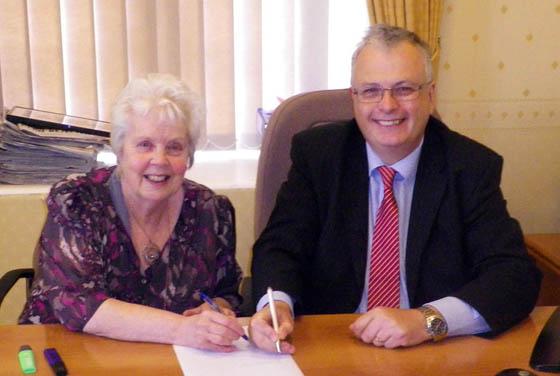This is the last piece to look at what happened at this week's meeting of Carmarthenshire County Council, but a subject which is certain to raise its ugly head again in the future.
This blog and other sources reported recently how one of the county councillors, Sian Caiach, discovered that council officers had been monitoring her e-mail account, and at Wednesday's meeting a second councillor, Bill Thomas (Lab) said that he had been the subject of covert filming by the council.
The two councillors have other things in common. Both have been a thorn in the side of the council executive for a long time. Both have campaigned for years against over-development, building on land prone to flooding and pollution of the Burry Inlet. Cllr Caiach is currently fighting a
prosecution being brought by the council, and it is understood that Cllr Thomas has reason to believe that legal action may be taken against him also.
Matters between Cllr Caiach and the Chief Executive of the council came to a head last year when the Mr James submitted a catalogue of formal complaints against Cllr Caiach to the Ombudsman for Public Services alleging that she had breached the councillors' code of conduct.
Every one of the complaints was dismissed, and it is unlikely that that defeat has been forgotten.
Most of the facts about the monitoring of Cllr Caiach's e-mails are now out in the open. What lies behind Cllr Thomas's claims is not, but he was clearly very upset at what had happened to him.
Both now join the list of people and newspapers who have been bullied in various ways in recent years for criticising the way the council is run.
_________________________
The rest of this post looks at the various statements made at Wednesday's meeting. Fortunately it was all recorded for posterity, and some of the claims and tactics used deserve careful scrutiny.
At Wednesday's meeting Cllr Darren Price raised the monitoring of Cllr Caiach's e-mails, and announced that he would be seeking a full investigation into the circumstances of the monitoring by the Policy and Resources Scrutiny Committee. He then asked Kevin Madge, the leader of the council, a series of simple questions about covert monitoring of e-mails, including whether he was aware that monitoring had taken place. The questions went unanswered, but we got the first of a series of increasingly angry interventions from the chief executive.
All councillors signed up to the council's e-mail policy, he said, and "that includes monitoring from time to time what goes on". Individual members were not asked to give authority to have things looked at, that did not happen, he added.
What that probably means is that the Council Leader was not told about the monitoring of a councillor's e-mails by unelected officers.
Mr James then turned to the case of Cllr Caiach. It is worth quoting his words verbatim.
"It had to do with a court case where disclosure of documents, e-mails and everything else was required by the High Court". He would be quite happy to provide that information to members.
Linda Rees-Jones, the council's Head of Law, added that she was aware of the incident. The e-mail had not been read, but it was tracked to see where it had been sent.
The Chief Executive then immediately jumped in again to reject an accusation that there was a department of council officers sitting monitoring e-mails. "This was completely fallacious. There is no truth to that at all".
Next came a scarcely veiled threat. The officer whom the Chief Executive said was at the centre of allegations "was extremely upset and taking advice from his union and legal advisers".
There are several things which the Policy and Scrutiny Committee may want to consider if it gets round to investigating this case.
- Firstly the person at the centre of the row is not the IT manager who accessed Cllr Caiach's e-mails, but the anonymous individual who instructed him to do it. Almost certainly someone sitting on the podium.
- Nobody, as far as anyone can establish, has claimed that there is a department of council spies monitoring councillors' e-mails. Perhaps the Policy and Resources committee will ask the chief executive to show them where this accusation was made.
- What Mr James described as "allegations" are in fact a formal complaint made on the basis of hard documentary evidence of monitoring.
- Councillors may also want to ask why the "Attendance Form" requesting access to Cllr Caiach's e-mail account was anonymous. Surely, if council officers request access to the e-mails of an elected councillor there should be a record making it clear who made the request and why.
- But perhaps most serious of all was the claim that the monitoring in September 2011 was required by the High Court.
What had actually happened was that a couple of days before the council carried out the snooping, it had received what is known as a "Letter before Action" from Jacqui Thompson's solicitors advising the council that legal action would be taken if certain steps were not taken (e.g. an apology). At that stage no action had been initiated and no papers lodged with a court. The first the High Court heard about the case was in mid-November 2011, two and a half months after the monitoring.
The disclosure process ordered by the High Court in the run-up to the trial did not take place until a year after Cllr Caiach's e-mails were accessed.
Let us remind ourselves of what Mr James told councillors again:
"It had to do with a court case where disclosure of documents, e-mails and everything else was required by the High Court".
Mrs Rees-Jones also said that she had "been told that the e-mail itself had not been read", giving everyone watching the impression that this whole matter was something she had only become aware of after the event.
What she did not mention was that there had been no need to read the e-mail because Cllr Caiach had sent it to all 74 councillors as well as the chief executive himself. She might have added that the contents of the e-mail were nothing more than a statement calling on the council to film its proceedings.
Following that round of exchanges, Cllr Bill Thomas was slapped down when he tried to talk about his own experiences of surveillance, although seconds before the curtain came down he managed to shout that he had been the subject of covert surveillance by the council.
The Chief Executive became increasingly agitated. He told councillors that "we do not surveil anybody, and certainly not members of this council." Claims to the contrary were "untruths" . "It is not the case. It does not happen".
Given that the council's Head of Law had just admitted that it had happened and that there is cast-iron evidence that it happened in the case of Cllr Caiach, the chief executive was presumably inviting councillors to suspend their critical faculties and believe his denials instead.
Cllr Price's attempt to force Kevin Madge to answer his questions (a right set out in the council's constitution) was ruled invalid because the issue under discussion was not on the agenda.
Big Brother is alive and well and living in Carmarthen.




